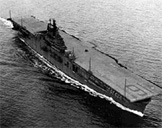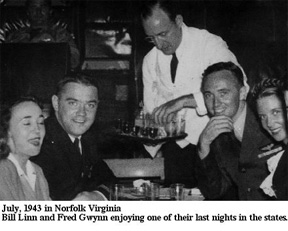|
Fred Gwynn's Chapter 3 |
||||||||||
 |
||||||||||
 |
||||||||||
|
|
||||||||||
|
In the movies, military men embark for foreign duty according to what seems at times an extravagant formula. Their training completed, they are given a riotous few days' leave to wind up or begin love affairs, and then they sail grimly off into the night. Torpedo 16 and the Lexington made a piker out of Hollywood. The month-and-half period between the end of the shake-down cruise and the final departure from the States was occupied almost entirely with liberty, love, and liquor.
|
||||||||||
 |
||||||||||
| First, we had a Memorable Leave of seven days, then a Good Time in Quonset, a Big Time in Boston, More Fun in Portsmouth and Norfolk, and a Rip-Roaring Liberty in Panama. And at the expected end of all this prodigal sport, we found ourselves in Hawaii, Land of Enchantment. |
||||||||||
|
Quonset in June was no longer bleak, and, anyway we did as little flying as possible. John Bowen, Travis Oliver, Ben Williams, and Meat-Axe Thompson had a room in B.O.Q. (most of the Squadron wives had been packed off home when their husbands left on the shake-down) that rocketed with nightly revelry. Many trips to Providence or to the near-by Kingston Inn were made. Almost as a body, the Squadron espoused the beach-club life furnished by the pleasant Dunes Club a few miles down Narragansett Bay towards the sea. I spent almost every night in Wickford, where David and Eloise Worcester deluged their guests with superb food and drink and conversation, and where one could sleep in a four-poster bed whose coverlet was not labeled "U.S.N."
This fantastic interim, in which torpedo attacks were forgotten, was continued by a gala week in Boston, where the Lex was tied up - just why she was at anchor, no one ever announced or bothered to inquire. There just wasn't time. Everyone had to stay in his sack until 1100 (in order to get seven hours' sleep), and after lunch it was always time to start shaving and showering and being sewed into the summer white uniforms for the day's activities. In the middle of the afternoon, hundreds of officers and men poured through the South Boston dock area to the South Station, where taxis could be engaged for the rigorous trip uptown to the hotels and restaurants and theatres and bars that formed the background for the evening's encounter. Wives were recalled from the various parts of the United States, old New England ties were renewed, and many new ones formed, for the war had un-recognizably dissipated Boston's staidness. One night, Bill Linn and I stood on the corner of Tremont and Stuart Streets and counted four promenading groups of five unattached gals within five minutes. At the intersection of Tremont and Boylston you could see at least one shipmate on every corner. Munchkin Degado said the hell with the Navy and organized a double-date with his enlisted gunner, George Knapp. A portion of Torpedo 16 took over the elevator at the Ritz-Carlton and brought back memories of previous American Legion conventions. The whole Air Group tried unsuccessfully to get tables at Locke-Ober's every night for dinner. Four of us went to see Junior Miss at the Colonial Theatre one evening and ended up taking all the pretty little junior misses in the cast to all the night spots in town during the rest of the week. It was Wassail All and Let the Army Fight the War. The skipper of the Lex, Capt. Stump, was also apparently rejuvenated, for he wangled a trip to San Diego by volunteering, in his forties, to ferry a TBF for the long cross-country trip. One day (after we finally got underway from Boston) someone leaned on an actuating handle that set off the sprinkler system and flooded the hangar-deck. "Well, at least that's one thing that works on this damned tub," Capt. Stump was reported to have said. Suddenly, scuttlebutt had it that all kinds of things were wrong with the ship. This was news to us, for, as pilots rather than ship's officers, we had come to think of CV-16 as an autonomous machine, put together by human agency, possibly, at the Bethlehem Yards, but now functioning under a mysterious mechanical power of its own. We knew that planes could get out of order, but it was unthinkable for such a gigantic craft as a carrier to have technical failures, and, when it became thinkable, cosmically humorous. We laughed when a catapult or elevator failed. It was a joke when the flight deck crew had trouble folding the wings of the new Grumman Hellcats our fighters had been lucky enough to get. But it wasn't very funny when we realized that the process was being watched on the bridge by no less than Admiral King and General Marshall, the two military chiefs of the country, who were making the Boston - Norfolk run to see how efficiently the newest type of carrier could operate. And it wasn't funny when the fuel holds sprung a leak; thousands of gallons of aviation gasoline had to be drained into the Atlantic, and thousands of inveterate cigarette-smokers temporarily had to give up smoking. Repair and relief came at the Portsmouth Navy Yard, where we had two more weeks of Officers' Clubs and ever-following wives. At least Bill Linn was able to re-connect with Jennie Schriver the girl he had met a few months back, but the gangrene of delay was beginning to make us fretful, and the extension of our "training period" began to chafe. It is agonizing for carrier pilots to attend ground school when the ship is in port, but that's what Torpedo 16 did. An un-remembered genius invented the term "tamping" to describe tamporizing ground activity: our pursuit of apparently academic studies (ship and aircraft recognition, code, blinker, signal flags, and lectures on doctrine) was compared to the utterly useless activity of "tamporizing turf," a (once again I am driven to euphemism) listless repeated patting of sterile waste. By a master-stroke, Cap'n Bob Isely was designated as "TINCUS" or "Tamper-in-Chief, U.S.Fleet." But the Skipper was nobody's fool. As much irked at delay as we, if a little more conscientious about making the best of it, he dashed off the beginnings of a "Tamping Song," which was completed by his henchmen. It was one of the first actions that implied no breach between himself and his Squadron. On July 22, 1943, we left The United States for good, Relieved once again when the ship turned right out of Hampton Roads, after over a year of Navy training we were at last headed for the Second World War. We further guessed that the Pacific War was our destination, since Undersecretary of the War Patterson was aboard and we could imagine no reason for his going to Africa. Flight operations became realistic when we got reports of actual German submarines in the area, and when we reached the Caribbean, we made an exciting speed run across that lovely sea, so that we would not have to hug the coast and the coastal anti-sub patrols. When we saw the Panama Canal with her barrage balloons ahead, and looked aft to see two smaller carriers catching up with us, it appeared that we were actually operating. The cities of Canal Zone, Colon and Balboa - were a good deal like Trinidad and Port-of-Spain, except that here was plenty of night life, red lights, and souvenir merchandise, according to your predilection. One liberty night in each city convinced everyone that he had been wise to join the Navy. A night-club pantomime entitled "Beauty and the Beast" remains, I think, in everyone's memory as a thing of beauty and bestiality. End of Page 1 of Chapter 3 — Go to Page 2 Page — 1 — 2 — 3 — this chapter you may go to Introduction — Table of Contents Chapter — 1 — 2 — 3 — 4 — Epilogue — or Go to the Lexington Stories Cover Page Or Home - Contact Us - Cold War Hist. - 91st SRS Hist. - Stardust 40 Mission Story |
||||||||||